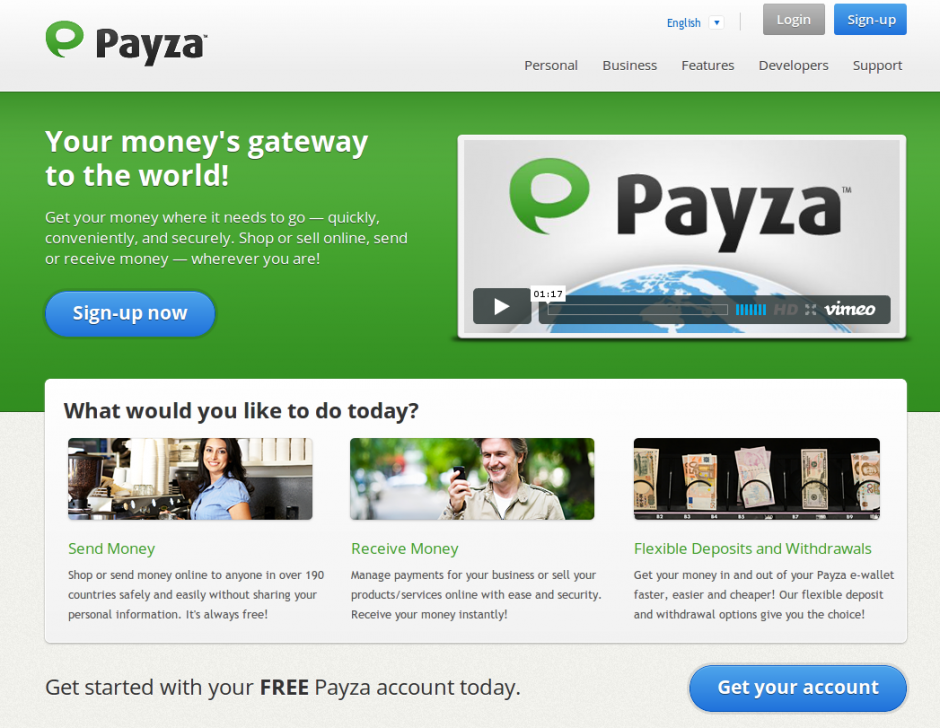PayPal Holdings, Inc. is an American company operating a worldwide online payments system. Online money transfers serve as electronic alternatives to traditional paper methods like checks and money orders. PayPal is one of the world's largest internet payment companies.The company operates as an acquirer, performing payment processing for online vendors, auction sites and other commercial users, for which it charges a fee.
Established in 1998, PayPal had its IPO in 2002, and became a wholly owned subsidiary of eBay later that year. In 2014, PayPal moved $228 billion in 26 currencies across more than 190 nations, generating a total revenue of $7.9 billion (44% of eBay’s total profits).The same year, eBay announced plans to spin-off PayPal into an independent company by mid-2015 and was complete on July 18, 2015.
PayPal was initially established in December 1998 as Confinity, a company that developed security software for handheld devices founded by Max Levchin, Peter Thiel, Luke Nosek, and Ken Howery. PayPal was developed and launched as a money transfer service at Confinity in 1999, funded by John Malloy from BlueRun Ventures.
In March 2000, Confinity merged with X.com, an online banking company founded by Elon Musk.[15] Musk was optimistic about the future success of the money transfer business Confinity was developing. Musk and then-president and CEO of X.com, Bill Harris, disagreed on this point and Harris left the company in May 2000. In October of that year, Musk made the decision that X.com would terminate its other internet banking operations and focus on the PayPal money service. The X.com company was then renamed PayPal in 2001, and expanded rapidly throughout the year until company executives decided to take PayPal public in 2002. as listed under the ticker PYPL at $13 per share and ended up generating over $61 million.
Shortly after PayPal's IPO, the company was acquired by eBay in July 2002 for $1.5 billion. More than 70 percent of all eBay auctions accepted PayPal payments, and roughly 1 in 4 closed auction listings were transacted via PayPal. PayPal became the payment method used by a majority of eBay users (it was also the default choice), and the service competed with eBay's subsidiaryBillpoint, as well as Citibank's c2it, Yahoo!'s PayDirect, Google Checkout, and Western Union's BidPay service, all of which closed in subsequent years.
PayPal acquired the VeriSign payment solution in 2005 to expand its e-commerce business and provide added security support. In 2007, PayPal announced a partnership with MasterCard that led to the development and launch of the PayPal Secure Card service, a software that allows customers to make payments on websites that do not accept PayPal directly by generating a unique, single-use MasterCard number for each checkout. By the end of 2007, the company generated $1.8 billion in revenue.
In January 2008, PayPal acquired Fraud Sciences, a privately held Israeli start-up company with expertise in online risk tools, for $169 million, in order to enhance PayPal's proprietary fraud management systems. In November 2008, the company acquired Bill Me Later, an online payments company offering transactional credit at over 9000 online merchants in the US. PayPal revenues for Q1 2009 were $643 million, up 11 percent year over year. 42 percent of revenues in Q1 2009 were from international markets. PayPal's Total Payment Volume (TPV), the total value of transactions in Q1 2009 was nearly $16 billion, up 10 percent year over year.
By 2010, PayPal had over 100 million active user accounts in 190 markets through 25 different currencies. In July 2011, fourteen alleged members of the Anonymoushacktivist group were charged with attempting to disrupt PayPal's operations. The denial of service attacks occurred in December 2010, after PayPal stopped processing donations to Wikileaks. On December 5, 2013, 13 of the PayPal 14 plead guilty to misdemeanor and felony charges related to the attacks.
The company continued to focus on international growth and growth of its Merchant Services division, providing e-payments for retailers on eBay. In 2011, PayPal announced that it would begin moving its business offline so that customers can make payments via PayPal in stores. In August 2012, the company announced its partnership withDiscover Card to allow PayPal payments to be made at any of the 7 million stores in Discover Card's network. By the end of 2012, PayPal's total payment volume processed was US$145 billion. and accounted for 40% of eBay's revenue, amounting to US$1.37 billion in the 3rd quarter of 2012.
In 2013, PayPal acquired IronPearl, a Palo Alto startup offering engagement software, and Braintree, a Chicago-based payment gateway, to further product development and mobile services. In June 2014 David Marcus announced he was leaving his role as PayPal President; Marcus joined PayPal in August 2011 after its acquisition of Zong, of which he was the founder and CEO. David Marcus succeeded Scott Thompson as president, who left the role to join Yahoo. PayPal announced that Marcus would be succeeded by Dan Schulman, who previously served as CEO of Virgin Mobile and vice president of American Express.



